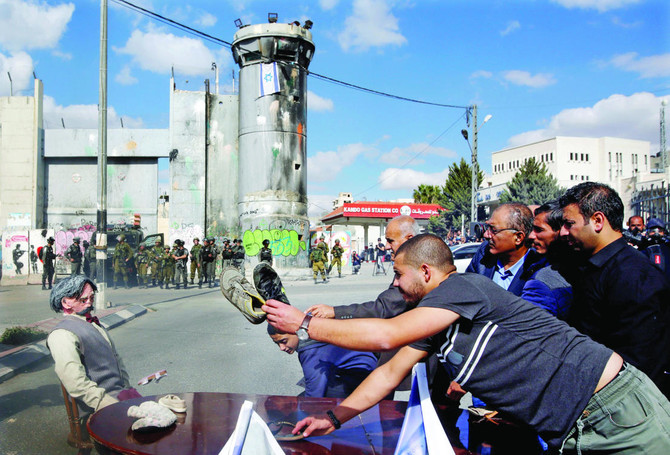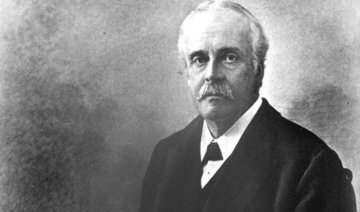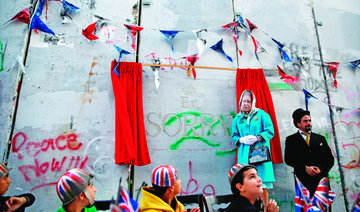LONDON: The UK government’s continued refusal to apologize for the 1917 Balfour Declaration has been criticized by those who see the document as being at the root of today’s Israeli-Palestinian conflict.
The growing demand for an apology is accompanied by pleas for a critical review of the UK’s foreign policy and its responsibilities toward the Palestinians.
“An apology is an important symbolic act,” said Prof. Ilan Pappé, director of the European Centre for Palestine Studies at the University of Exeter. “But it should be accompanied by a sense of accountability, hence what I suggest is that a change of British current policy on Palestine is the best way to atone for the Balfour Declaration,” he said.
Today marks the centenary of the date of the controversial document. It was signed in 1917 by then-Foreign Secretary Arthur Balfour, who expressed his support for the creation of a “national home” for the Jewish people in Palestine and set in motion a series of events resulting in the creation of Israel in 1948.
The document also pledged that the “civil and religious rights” of existing non-Jewish communities in Palestine would not be prejudiced, a promise that many argue the UK has broken, and for which the Palestinian people are now owed an apology.
“For decades one of the biggest grievances the Palestinians have is that there has been no recognition that they have been dealt an injustice,” said Karl Sabbagh, a Palestinian writer and documentary producer.
“Regardless of whether this injustice is rectified or not, it is a slap in the face to be told, effectively, ‘you have no grounds for complaint’,” he said.
The UK-based campaigning group, the Palestinian Return Centre, relaunched its Balfour Apology Campaign on Oct. 25, demanding that the UK government acknowledge its responsibility in the current divide between Israelis and Palestinians. The campaign is running a petition to demand an official apology from the government.
The UK has so far rejected calls for an apology, initially issuing an official statement in April that was followed by Prime Minister Theresa May’s address to Parliament in late October, in which she said the government would “certainly mark the centenary with pride.”
Foreign Secretary Boris Johnson wrote in his Daily Telegraph column on Oct. 29 that the declaration was “indispensable to the creation of a great nation,” adding that the document fulfilled an “incontestable moral goal” and provided a “persecuted people with a safe and secure homeland.”
Johnson did go on to acknowledge that the caveat to safeguard the interests of the Palestinians “has not been fully realized.” He backed the concept of a two-state solution to the Israeli-Palestinian conflict, with the borders based on the lines as they were before the 1967 war.
May will be marking the anniversary with a celebratory dinner with her Israeli counterpart Benjamin Netanyahu and a select group of MPs, a move that has angered many who see Israel’s current expansionary policies and settlements in the West Bank as infringing on the rights and wellbeing of the Palestinian people.
There are other celebrations taking place in the UK, including an event organized by Balfour 100 bringing Christians and Jews together at the Royal Albert Hall in London for an evening of music and dance.
“There is also a very active lobbying effort in support of Israel, which has promoted the Balfour centenary as a time to celebrate the British-Israeli relationship rather than to take a critical view of the legacy of the declaration,” said Adam Sutcliffe, reader of history at King’s College London. Sutcliffe is also a member of the Independent Jewish Voices steering committee, which has recently produced a film called “100 Years After Balfour,” which examines the politician’s legacy.
“The UK government has, it seems, been persuaded that many British Jews would be very unhappy if they did not support this celebration,” he said.
Many are unhappy about the idea of “celebrating” the declaration, and rather call for the government to use the centenary as a chance to learn from the past.
“It is not an anniversary to celebrate,” said John Bond, spokesperson for the Balfour Project, a UK-based organization which aims to educate the government about the legacy of the declaration.
“It is a time to look afresh at the declaration and its outcomes,” he said. “We will continue working for an apology from our government. An apology is not just words. It must include a commitment to help improve the conditions in which many Palestinian people live, and to work for a just political settlement,” he said.
It is important that efforts to secure an apology are not misinterpreted as a way of questioning Israel’s right to exist, said Miranda Pinch, an activist and producer of a new documentary on the legacy of Balfour.
“I think that what is sought is an acknowledgment of accountability and failure on the part of the UK government, rather than an apology as such,” she said. “The problem with an apology is that it can be seen as a regret about the creation of Israel and, at this stage, I don’t think that would be helpful for anyone.”
She added that the UK government has failed “to hold Israel accountable in any meaningful way for its continued human rights violations, illegal occupation and land theft of what was left of historic Palestine.”
Sutcliffe added: “I’m not sure how helpful an official British apology would be; once the UK government starts to apologize for its colonial past, there would be many other apologies to make also.
“However, the UK government should certainly not be celebrating the Balfour Declaration. It should be encouraging a nuanced and critical approach, focusing attention on the negative impact of the declaration on Palestinians, who continue to suffer and to be denied basic justice and human rights, whether in the occupied West Bank, effectively still blockaded in Gaza, or in refugee camps elsewhere.”
UK’s refusal to apologize for Balfour draws criticism
UK’s refusal to apologize for Balfour draws criticism

Women main victims of Sudan conflict abuses: minister to AFP

- Khalifa said sexual violence has been reported on both sides, but she insisted it is “systematic” among the RSF
- Her ministry has documented more than 1,800 rapes between April 2023 and October 2025
PORT SUDAN: Women are the main victims of abuse in Sudan’s war, facing “the world’s worst” sexual violence and other crimes committed with impunity, a rights activist turned social affairs minister for the army-backed government told AFP.
The Sudanese army and the paramilitary Rapid Support Forces (RSF) have been locked in a brutal conflict since April 2023 that has killed tens of thousands of people, displaced around 11 million and been marked by widespread sexual violence.
Sulaima Ishaq Al-Khalifa said abuses against women routinely accompanied looting and attacks, with reports of rape often perpetrated as “the family witnessed” the crime.
“There is no age limit. A woman of 85 could be raped, a child of one year could be raped,” the trained psychologist told AFP at her home in Port Sudan.
The longtime women’s rights activist, recently appointed to the government, said that women were also being subjected to sexual slavery and trafficked to neighboring countries, alongside forced marriages arranged to avoid shame.
Khalifa said sexual violence has been reported on both sides, but she insisted it is “systematic” among the RSF, who she says use it “as a weapon of war” and for the purposes of “ethnic cleansing.”
Her ministry has documented more than 1,800 rapes between April 2023 and October 2025 — a figure that does not include atrocities documented in western Darfur and the neighboring Kordofan region from late October onwards.
“It’s about... humiliating people, forcing them to leave their houses and places and cities. And also breaking... the social fabrics,” Khalifa said.
“When you are using sexual violence as a weapon of war, that means you want to extend... the war forever,” because it feeds a “sense of revenge,” she added.
- ‘War crimes’ -
A report by the SIHA Network, an activist group that documents abuses against women in the Horn of Africa, found that more than three-quarters of recorded cases involved rape, with 87 percent attributed to the RSF.
The United Nations has repeatedly raised alarm over what it describes as targeted attacks on non?Arab communities in Darfur, while the International Criminal Court (ICC) has opened a formal investigation into “war crimes” by both sides.
Briefing the UN Security Council in mid-January, ICC deputy prosecutor Nazhat Shameem Khan said investigators had uncovered evidence of an “organized, calculated campaign” in El-Fasher — the army’s last stronghold in Darfur captured by the RSF in late October.
The campaign, Khan added, involved mass rapes and executions “on a massive scale,” sometimes “filmed and celebrated” by the perpetrators and “fueled by a sense of complete impunity.”
Darfur endured a brutal wave of atrocities in the early 2000s, and a former Janjaweed commander — from the militia structure that later evolved into the RSF — was recently found guilty by the International Criminal Court of multiple war crimes, including rape.
“What’s happening now is much more ugly. Because the mass rape thing is happening and documented,” said Khalifa.
RSF fighters carrying out the assaults “have been very proud about doing this and they don’t see it as a crime,” she added.
“You feel that they have a green light to do whatever they want.”
In Darfur, several survivors said RSF fighters “have been accusing them of being lesser people, like calling them ‘slaves’, and saying that when I’m attacking you, assaulting you sexually, I’m actually ‘honoring’ you, because I am more educated than you, or (of) more pure blood than you.”
- ‘Torture operation’ -
Women in Khartoum and Darfur, including El-Fasher, have described rapes carried out by a range of foreign nationals.
These were “mercenaries from West Africa, speaking French, including from Mali, Burkina Faso, Nigeria, Chad, as well as Colombia and Libya” — allegedly fighting alongside the RSF, Khalifa added.
Some victims were abducted and held as sexual slaves, while others were sold through trafficking networks operating across Sudan’s porous borders, said Khalifa.
Many of these cases remain difficult to document because of the collapse of state institutions.
In conservative communities, social stigma also remains a major obstacle to documenting the scale of the abuse.
Families often force victims into marriage to “cover up what happened,” particularly when pregnancies result from rape, according to the minister.
“We call it a torture operation,” she said, describing “frightening” cases in which children and adolescent girls under 18 are forced into marriage.














